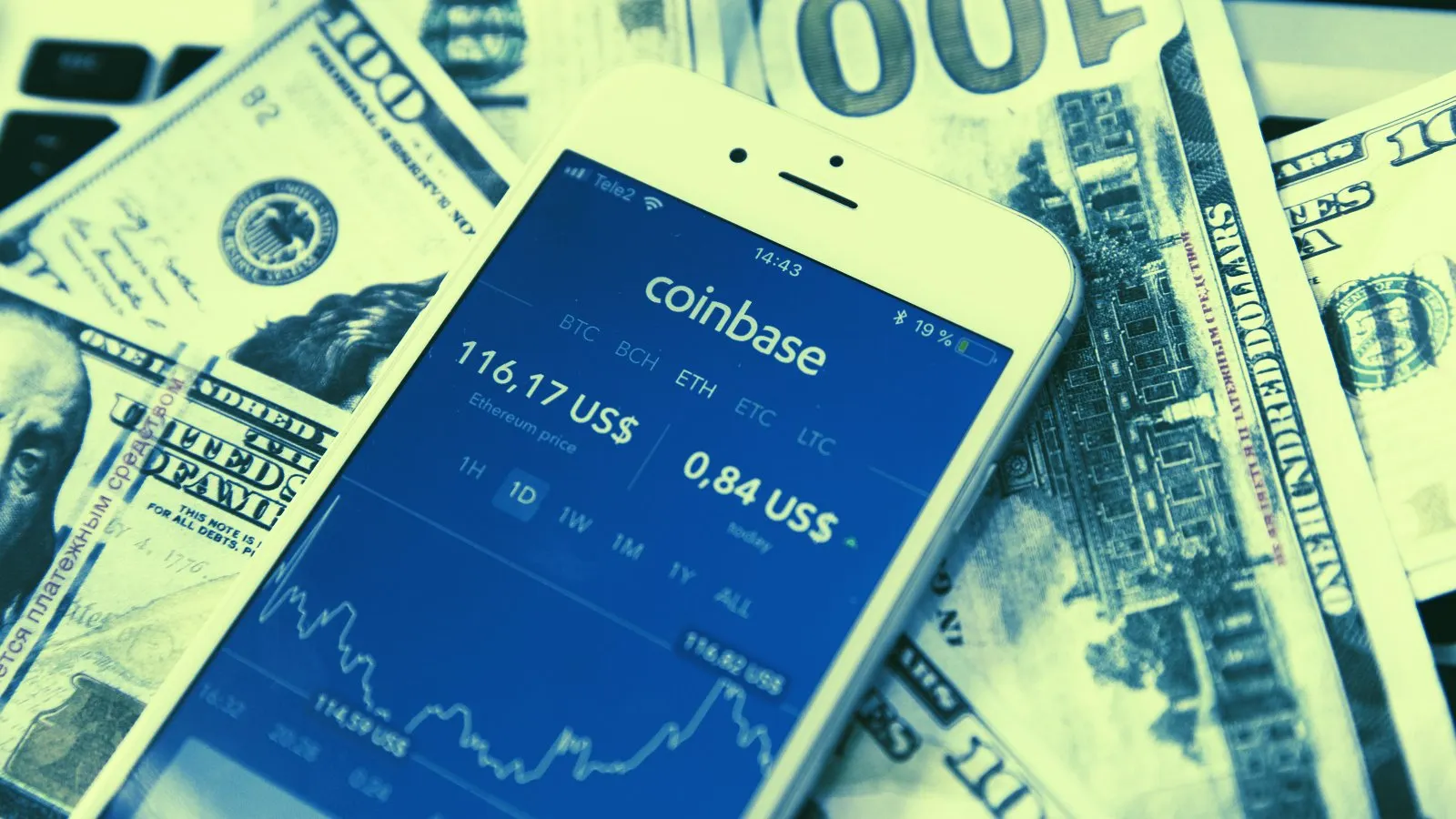In brief
- Cryptocurrency exchange Coinbase has selected Nasdaq as the venue for its direct listing.
- A direct listing is limited to existing shares, whereas an initial public offering (IPO) involves the creation of new shares.
- On Nasdaq Private Market, a secondary market for Coinbase stock ahead of the listing, the company has been valued at $90 billion.
In January 2021, San Francisco-based cryptocurrency exchange Coinbase announced plans to go public via a direct listing.
The company shared the news in a blog post, in which it announced its intent "to become a publicly-traded company pursuant to a proposed direct listing of its Class A common stock."
Here it comes! @coinbase is doing a direct listing. (disclosure: Coinbase is an investor in @Vertalo_ )https://t.co/edQO3pSeLL
— Dave Hendricks (@davehendricks) January 28, 2021
The following month, Coinbase filed its Form S-1 with the SEC, a document that provides would-be investors with a detailed overview of a company going public, including its financial information and risk factors.
Coinbase's filing revealed that the exchange brought in a $322 million profit on revenues of over $1.2 billion in 2020. It even sent a copy of the filing to Satoshi Nakamoto, the pseudonymous inventor of Bitcoin, as a symbolic gesture.
Following the filing, Coinbase announced that it would list its shares on the Nasdaq on April 14, with shares trading under the ticker symbol COIN.
Direct listing vs IPO
Coinbase has opted for a direct listing over a traditional IPO.
In the past, a direct listing meant a company could only float its existing shares, whereas an IPO allows for the creation of new shares. While the SEC recently lifted that restriction, Coinbase nonetheless declined to create new shares for the offering–which means it will not dilute its existing equity. The direct listing also means Coinbase can avoid some of the onerous (and expensive) requirements of an IPO, including using the services of intermediaries known as underwriters.
We have confidentially submitted our draft registration (Form S1) with the Securities and Exchange Commission. https://t.co/U6d0sVz0aX
— Coinbase (@coinbase) December 17, 2020
The upshot of the direct listing is that anyone will be able to buy and trade shares in Coinbase, potentially drawing a lot more investors into the industry.
What Coinbase's Form S-1 revealed
Coinbase's Form S-1 filing contains a wealth of insight into how the exchange has performed over the last few years—and what risk factors might affect its upcoming direct listing.
For a start, the S-1 shows how Coinbase has grown significantly. According to the filing, Coinbase now has 43 million "verified" users, and 2.8 million monthly active users. In total, these users have made $456 billion of trades since the exchange opened in 2012.
As noted, Coinbase was also profitable in 2020—making it a rarity among tech unicorns that have gone public. Its 2020 profit of $322 million was also a significant jump from 2019, when the exchange lost $30 million on $533 million of revenue.
Among the risks described in Coinbase's S-1 are the inherent volatility of cryptocurrencies and the prospect of another "crypto winter"—a term used for a bear market that lasts several years.
The filing also mentioned that venture capitalist Marc Andreessen owns the most common stock in Coinbase. He has 5.5 million shares, with Coinbase CEO Brian Armstrong behind him with 2.7 million shares.
Coinbase: the basics
Coinbase opened to the public in 2012. With the backing of about half a billion dollars from venture capitalists, the crypto exchange grew and grew, attracting over 35 million customers by July of 2020. In December 2020, crypto market analysis firm Messari valued the exchange at $28 billion.
Following Coinbase's IPO announcement, we value the company at $28 billion. Coinbase is one of the most prominent exchanges with $1 billion daily volume in Dec-20.
Check out our model and edit it to your own assumptions. https://t.co/BQeSAxUd5j— Mira Christanto (@asiahodl) December 18, 2020
Coinbase has two primary lines of business.
The first, Coinbase, is the cryptocurrency wallet and brokerage service so popular among the public. On Coinbase, users can buy and sell crypto within Coinbase using fiat currencies (i.e. ‘regular’ currencies like the dollar, sterling, or euro). It’s a brokerage, meaning that you technically buy and sell from and to Coinbase itself.
Then there’s Coinbase Pro, a more advanced exchange (originally called GDAX) where users can buy and sell cryptocurrencies directly from other users, comparable to dozens of other exchanges, which also allows for more advanced types of trades.
How does Coinbase make money?
To make money, Coinbase charges several different fees on its brokerage app, including for buying and selling Bitcoin and other cryptocurrencies. Fees are more expensive for smaller purchases, and when customers move funds out of Coinbase.
These fees also apply to Coinbase Pro. It’s more expensive than its main competitor, Binance, but its selling point is greater compliance with regulators. Binance does operate in the US, but under the auspices of a relatively tiny independent subsidiary, Binance.US.
Coinbase also has a venture capital arm, Coinbase Ventures, which invests in companies such as CoinTracker, Compound and BlockFi.
Due to a technical issue, we are experiencing degraded service where some trades may not be able to be completed. Our team is working to quickly restore service back to normal, and we’ll send another update soon. Thank you for your patience. https://t.co/yCxdIQAK2Z
— Coinbase Support (@CoinbaseSupport) January 29, 2021
When will the Coinbase listing happen?
Coinbase will list on the Nasdaq on April 14, but shares won't be available when the market opens at 9:30am EST, instead likely going available around mid-day or later in the afternoon. The reference price—$250 a share—according to a notice issued by Nasdaq, was lower than initial rumors that Coinbase stock would initially sell for around $400.
In any case, the opening price will likely only matter for a brief moment. Soon after, market demand will determine how much shares cost, meaning that Coinbase stock could trade much higher than this, especially if it benefits from any kind of opening day momentum.
Rival crypto exchange Binance has also announced that it will list a Coinbase Stock Token against the Binance USD stablecoin (BUSD). This means that users of the crypto exchange will be able to trade fractions of Coinbase stock after it is listed on the Nasdaq.
What the Coinbase listing means for crypto

Coinbase’s listing offers investors and traders another way to get exposure to the booming cryptocurrency market by owning shares. It also offers the peace of mind afforded by regulation from the SEC.
Coinbase has taken care to play nice with regulators. It’s shied away from listing privacy coins due to US regulators' hard-nosed attitude against them; it's also declined to list controversial coins like Tether, the US dollar stablecoin that's currently under investigation by the New York Attorney General.
Coinbase is also looking to address a recurrent issue that's plagued it, and other exchanges: downtime during periods of cryptocurrency price volatility. Recent record trading volumes have driven traffic to the exchanges to new heights, putting their infrastructure under strain and causing outages. Coinbase is reportedly planning to break its "monolithic" infrastructure into "separate discrete services" in order to better scale in the event of load surges.
Secondary markets on Nasdaq and FTX
While Coinbase shares don't become available to the public until April 14, they have been trading actively on forums like Nasdaq Private Market, which launched a secondary market for Coinbase stock. This allows existing shareholders, including current and former employees, to sell some of their holdings. Recent trades have valued the stock at $350 a share, which would place the company's total valuation at around $90 billion. Earlier, some shares had traded at $375 a share, which would imply a $100 billion valuation.
Crypto derivatives exchange FTX, meanwhile, has been running a pre-listing futures contract market for Coinbase shares in collaboration with German capital markets firm CM-Equity. The service allows investors to bet on what they think the shares will be worth.
What is Coinbase worth?
There has been a lot of speculation about what Coinbase's valuation should be. The optimistic view is that the company is worth $100 billion.
Several factors have gone into the idea that Coinbase is worth $100 billion, such as the ongoing crypto bull run and a recent all-time high in the price of Bitcoin, as well as an overall positive sentiment regarding the general crypto industry, in which Coinbase is a major player.
But more specifically, advocates of the $100 billion dollar valuation have pointed to the fact that Coinbase announced a record-breaking $730 million - $800 million profit for Q1 of 2021 on revenue of approximately $1.8 billion, dwarfing the company's performance for the entire previous year. The announcement came just eight days before its public listing, likely boosting sentiment around the company ahead of it going public.
However, not everyone is sold on this rosy view of Coinbase's listing. Ahead of the listing, stock research firm New Constructs released a report describing the company's anticipated $100 billion valuation as "ridiculous," suggesting it should be valued at a shade under $19 billion instead.
Its main argument was that Coinbase inhabits a nascent crypto market, that, once matured, will crush the company's profits—even by as much as 98%. Per the report, Coinbase collected approximately 0.57% of every transaction in fees in 2020. This came to $1.1 billion in trading revenue on $193 billion in trading volume—in turn making up 86% of revenue for 2020.
"As the cryptocurrency market matures and more firms inevitably pursue Coinbase's high margins, the firm's competitive position will inevitably deteriorate," the report said. Speaking with Decrypt one month earlier, New Constructs CEO David Trainer said "As long as Wall Street can get you going on the sentiment, as long as you stay focused on the drug high, you don't have to worry about the drug down."
And David Trainer is not alone in his pessimism. The Wall Street Journal also noted that Coinbase's valuation "might erode as crypto markets mature." Their report also noted that the company's price-to-earnings ratio—a key figure in assessing a firm's valuation—was around 90, an unusually high position.
What does Coinbase's listing mean for Bitcoin?
Crypto onlookers have also pondered what impact (if any) Coinbase's listing will have on Bitcoin, the industry's flagship cryptocurrency.
For many crypto advocates, Bitcoin will benefit from Coinbase going public; it's a "watershed moment" for the crypto industry, and heralds further mainstream adoption, Daniel Ives, managing director at Wedbush Securities, told Decrypt.
But obviously, that's a two-way street. If Coinbase is successful, it may trailblaze a path for other crypto firms to go public. But if it flops, other crypto companies reportedly mulling whether or not to go public, such as Kraken and Bakkt, could put their plans on hold.
But the overall view remains broadly optimistic. Ingo Fiedler, co-founder of the Blockchain Research Lab, suggested that Coinbase going public could help to onboard a new wave of traditional investors, telling Decrypt that, "Coinbase shares will give investors a way of exposure to Bitcoin that might not be willing to hold Bitcoin directly."
Disclaimer
The views and opinions expressed by the author are for informational purposes only and do not constitute financial, investment, or other advice.




